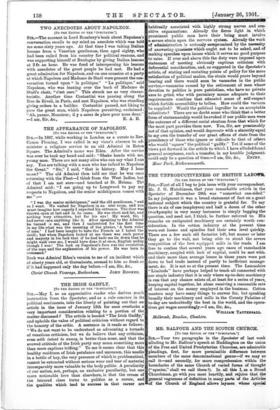THE UNPRODITOTWENESS OF BRITISH LABOIYIL
[To THE EDITOR OF THE "SPECTATOR.") SIR,—First of all I beg to join issue with your correspondent, Mr. J. G. Hutchinson, that your remarkable article in the Spectator of December 29th was "somewhat one-sided." In my judgment it was a broad statement of fact on a great national subject which the country is grateful for. To say there is six of one (employers) and half a dozen of the other (workpeople) in very many instances is simply begging the question, and need not, I think, be further referred to. His remarks on antiquated machinery are certainly worth con- sideration. In the cotton industry at the present time worn-out looms and spindles find their own level quickly. There are a few such old factories left, but sooner or later they go to the wall, not being able to stand the severe competition of the best equipped mills in the trade. I am free to confess that several years ago cases of ramshackle machinery, coupled with lack of capital, could be met with, and their more than average losses in those years were put down to bad trade instead of partly to inefficient manage- ment, Sic. It is not so at the present time. The Lancashire " Limiteds " have perhaps helped to teach all connected with our staple industry that it is only where up-to-date machinery is run that any chance exists of, at least for a series of years, keeping capital together, let alone receiving a reasonable rate of interest on the money employed in the business. Cotton masters may have many things to answer for, but speaking broadly their machinery and mills in the County Palatine of to-day are undoubtedly the best in the world, and the opera- tives get wages accordingly.—I am, Sir, &c., Melbrook, Bowdon, Cheshire.
WILLIAM TATTERSALL.


















































 Previous page
Previous page